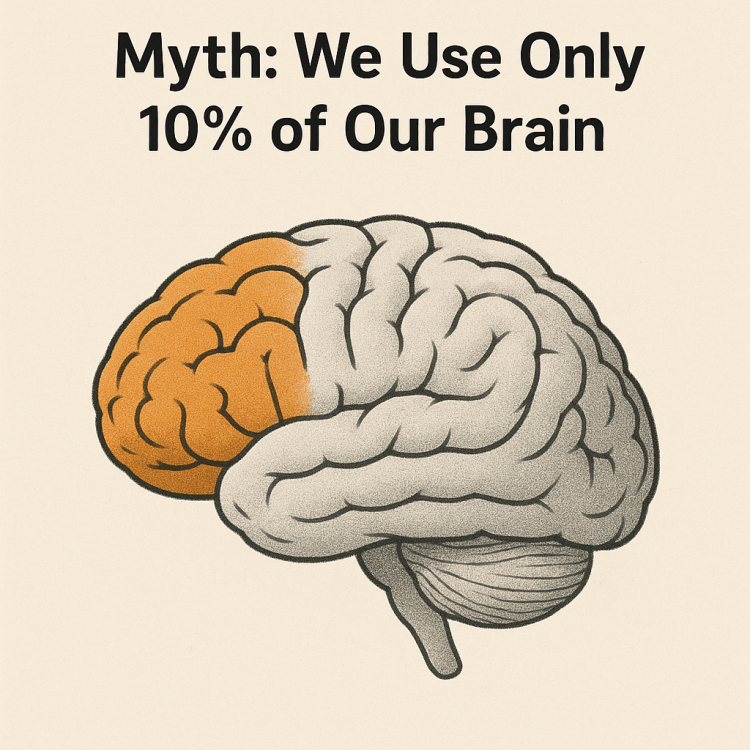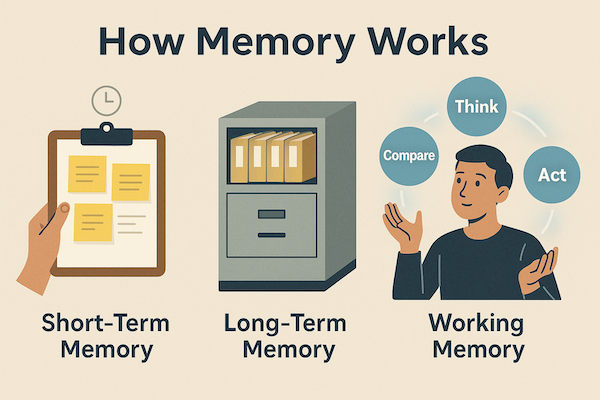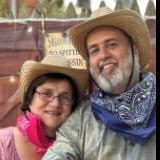“Only Using 10%?” — a Glimpse of Wonder entry™ —
I had always heard the claim that we only use 10% of our brains. It was said so often that I never questioned it. It sounded believable. After all, it often feels like more of my mind is offline than on — especially when I walk into a room and forget why I’m there.
 But as it turns out, that familiar statistic has no basis in fact. Brain scans show that nearly all areas of the brain stay active — even at rest. We’re not underusing the brain. We’re using it the way it was designed: with different regions contributing at different times. Some parts work quietly in the background, handling motion, memory, decision-making, emotion, and language — while others light up in response to sight, sound, or focused thought. If 90% of our brain truly lay dormant, we would expect damage to those areas to have no effect. But that’s not the case. Every part matters.
But as it turns out, that familiar statistic has no basis in fact. Brain scans show that nearly all areas of the brain stay active — even at rest. We’re not underusing the brain. We’re using it the way it was designed: with different regions contributing at different times. Some parts work quietly in the background, handling motion, memory, decision-making, emotion, and language — while others light up in response to sight, sound, or focused thought. If 90% of our brain truly lay dormant, we would expect damage to those areas to have no effect. But that’s not the case. Every part matters.
In fact, researchers at the University of Iowa and MIT have shown through PET and fMRI studies that even the most basic tasks engage multiple brain systems. And according to the Scientific American Mind report “Do We Really Use Only 10% of Our Brain?” (2014), this myth likely arose from misinterpretations of early neuroscience — not from evidence.
Jehovah did not give us wasted capacity. He gave us just what we need — and enough to grow into.
Scientists classify memory in three main ways: short-term, long-term, and working memory. Short-term memory is like a clipboard — temporary, fragile. Long-term memory acts more like a filing system, storing names, faces, places, and emotions for years, sometimes a lifetime. And working memory is the active part — the ability to hold a thought, compare it, test it, and act on it.
That, too, was part of our design. Jehovah created us not only to remember, but to think — to reason, weigh, and decide. As Proverbs 2:6 says, “Jehovah himself gives wisdom; from his mouth come knowledge and discernment.” Romans 12:2 adds, “Be transformed by the renewing of your mind,” showing that growth is possible. And Jesus, when asked what the greatest commandment was, included this: “You must love Jehovah your God with all your heart and with all your soul and with all your mind” (Matthew 22:37, all NWT).
The brain is physical. The mind is harder to define. And yet the two are never far apart. The Bible doesn’t use the word “brain,” but it speaks often of thoughts, reasoning, understanding, and the renewing of the mind. It speaks of wisdom, not just knowledge — and discernment, not just memory.
James 4:8 reminds us, “Draw close to God, and he will draw close to you.” Colossians 3:2 says, “Keep your minds fixed on the things above, not on the things on the earth.” And Philippians 4:8 offers a kind of mental filter: “Whatever things are true, whatever things are of serious concern, whatever things are righteous… continue considering these things.”
It’s reassuring to know that Jehovah sees value in the way we think — not just what we know, but how we use it. He invites us to align our thoughts with His. To shape our view of the world with His wisdom. To be led not by impulse, but by insight — the kind that comes from drawing close to Him.
Even in moments when our memory feels weak, our mind foggy, or our understanding slow to form, He remains the source of all clarity. No matter what part of the brain is active, He sees the full picture. And when we give Him our whole mind — not just 10% — we find the kind of peace and purpose that no scan can measure.
-
 1
1
-
 1
1

2 Comments
Recommended Comments
Join the conversation with your brothers and sisters!
You are posting as a guest. If you are already a member, sign in now to post with your existing account.
Note: Your post will require moderator approval before it will be visible.